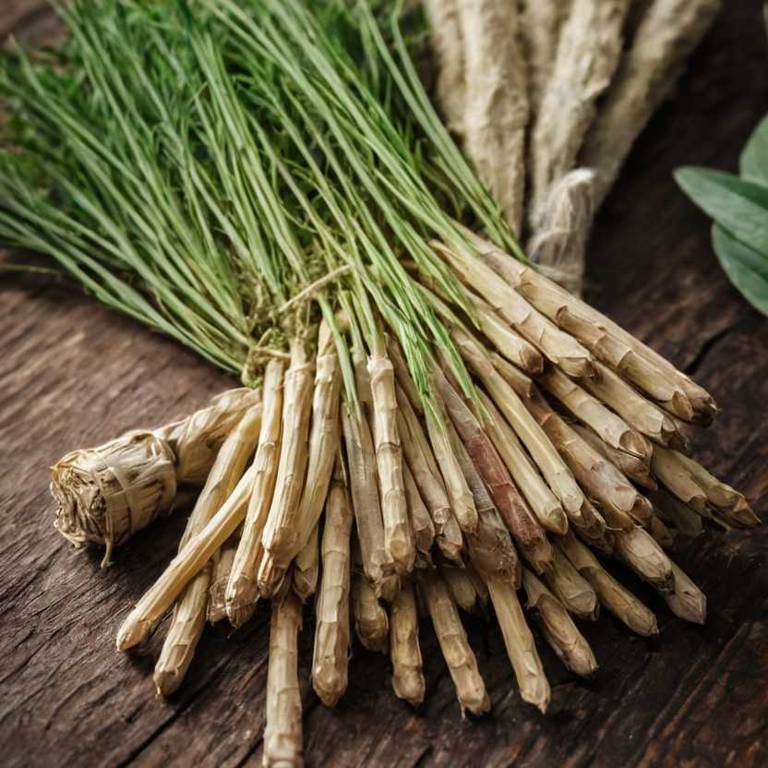Sweet Flag (Acorus calamus)
Sweet Flag (Acorus calamus) is a member of the Araceae family, native to Eastern Asia, North America, and Europe. Traditionally, its rhizomes, stems, and leaves have been used for decoctions, infusions, and powders.
This herb is particularly valued for its carminative, tonic, and bitter actions, and has a long history of use in traditional chinese medicine, european herbal medicine, and japanese kampo medicine.

Quick Facts / Key Information
| Common Name | Sweet Flag |
|---|---|
| Scientific Name | Acorus calamus |
| Plant Family | Araceae |
| Genus | Acorus |
| Species | calamus |
| Native Range | Eastern Asia, North America, Europe |
| Plant Parts Used | Rhizomes, Stems, Leaves |
| Primary Medicinal Actions | Carminative, Tonic, Bitter |
| Primary Traditional Systems | Traditional Chinese Medicine, European Herbal Medicine, Japanese Kampo Medicine |
| Historical Preparation Methods | Decoction, Infusion, Powder |
Botanical Identity
- Scientific Name
- Acorus calamus
- Common Name
- Sweet Flag
- Synonyms / Alternative Names
- Calamus, Acorus Calamus
- Plant Family
- Araceae
- Genus
- Acorus
Botanical Description
- Growth Habit
- Perennial herbaceous plant.
- Height
- It typically reaches a height of 1 to 2 meters.
- Leaves
- Smooth, dark green upper surface with lighter green lower surface, possessing distinct stomatal bands along the midrib.
- Stems
- Cylindrical, hollow, ridged, aromatic, herbaceous, terete, ascending, monopodial, branching at base, surface glabrous, nodes prominent, internodes elongated, leaf sheaths clasping, fibrous root system emerging from base.
Traditional Uses / Historical Use
Traditional Systems
- Traditional Chinese Medicine
- European Herbal Medicine
- Japanese Kampo Medicine
Historical Preparation Methods
- Decoction
- Infusion
- Powder
- Poultice
Medicinal Actions
- Carminative
- Traditionally described as a soothing carminative, within digestive system contexts.
- Tonic
- Historically regarded as a warming tonic, in general wellness contexts.
- Bitter
- Commonly referenced as a gentle bitter, in bitter herb groupings.
- Antispasmodic
- In herbal literature, noted as a cooling antispasmodic, in spasm-related situations.
Active Compounds
- Essential Oil
- Naturally occurring plant oils composed primarily of volatile constituents.
- Alkaloid
- A class of nitrogen-containing compounds produced by many plant species.
- Flavonoid
- A widely occurring class of plant polyphenols found in leaves, flowers, and fruits.
- Coumarin
- Organic compounds biosynthesized as part of plant secondary metabolism.
Modern Research Overview
Contemporary research on this plant includes areas such as chemical analysis, laboratory-based studies, and observational research. Detailed summaries of published findings are not included at this stage and will be added during future content updates.
Safety & Contraindications
- General Precautions
- General precautions have been noted regarding the use of this herb.
- Contraindications
- Specific contraindications associated with this herb have not been well documented.
- Allergies
- Sensitivity or allergy-related effects have not been clearly established.
- Drug Interactions
- There is insufficient evidence to determine whether this herb interacts with pharmaceutical drugs.
- Toxicity
- Available information regarding the toxicity of this herb is limited.
- Pregnancy & Breastfeeding
- Use during pregnancy or breastfeeding has not been clearly established in available sources.
Preparation & Usage Methods
- Infusion
- Plant material is steeped in hot water to extract water-soluble compounds.
- Decoction
- Plant parts are gently boiled in water to release soluble constituents.
- Poultice
- Fresh or dried plant material is applied externally to the skin.
- Powder
- This method converts dried plant material into a uniform powder.
- Tincture
- Plant material is macerated in alcohol to create a concentrated liquid extract.
Growing, Harvesting & Storage
Growing / Cultivation
- Soil
- Prefers humus-rich soil with moist but well-drained soil. Typically grows best in high organic matter soils.
- Sunlight
- Thrives in partial shade. Tolerates full sun to partial shade.
- Watering
- Prefers consistently moist soils. Tolerates variable moisture levels.
Medical Disclaimer
The information provided on this page is for educational and informational purposes only. It is not intended to diagnose, treat, cure, or prevent any medical condition. Always consult a qualified healthcare professional before using any herb for medicinal purposes.